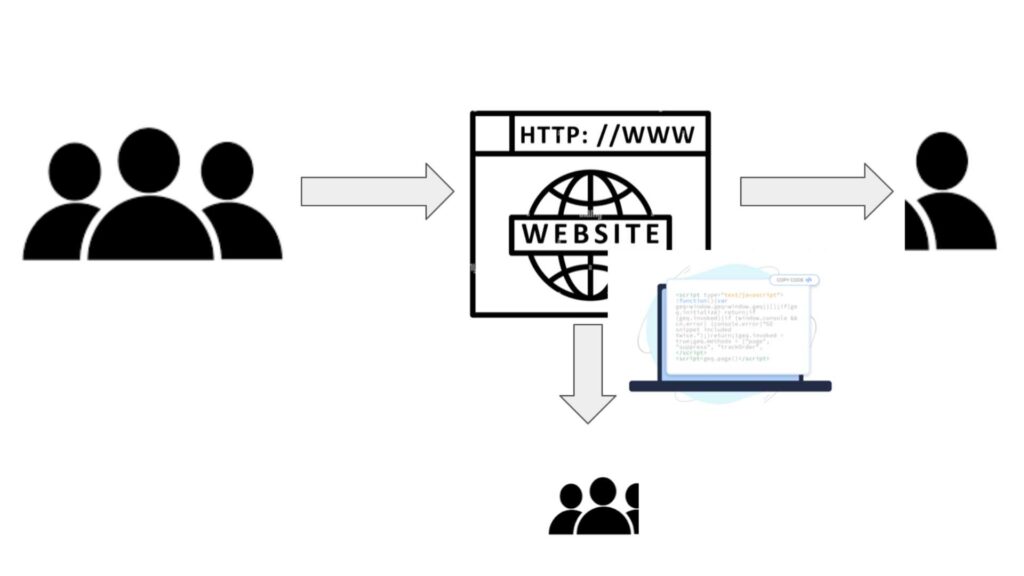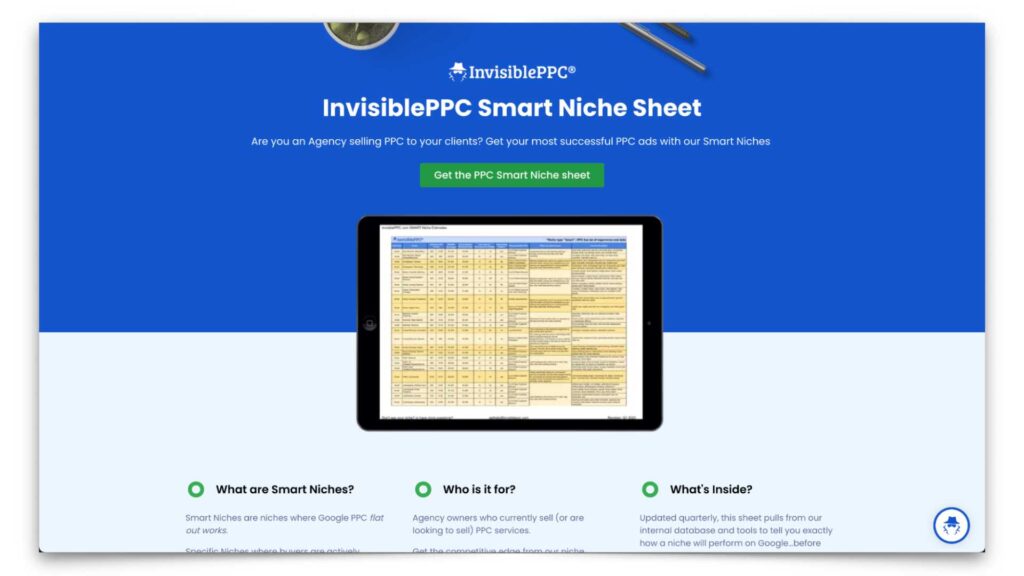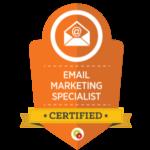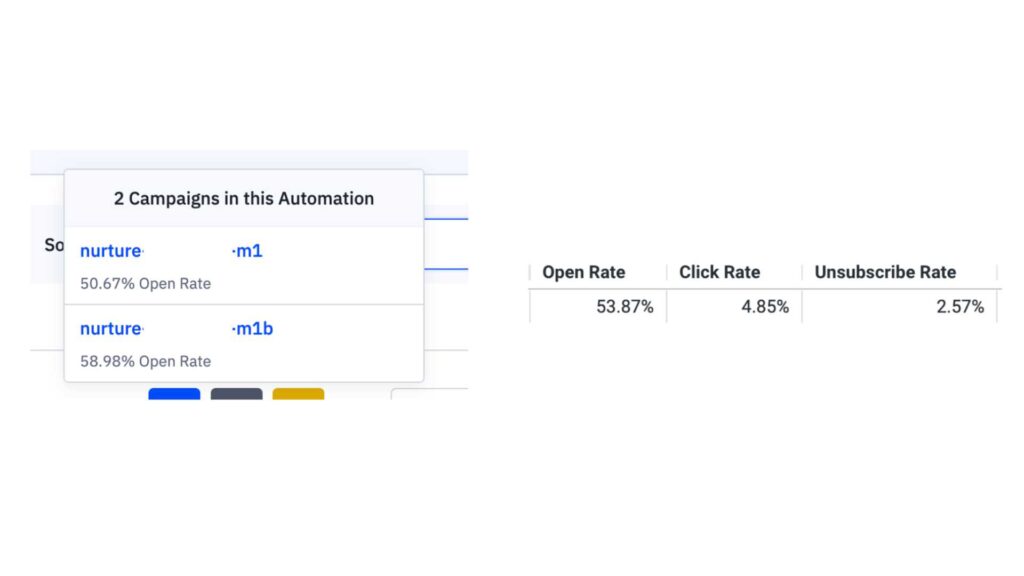
Page conversion rates have ALWAYS been a problem. The simple fact is most people don’t convert even on the most optimized pages.
What’s why traditional retargeting on ad networks has been so dang powerful. While retargeted leads come cheap, they still aren’t free. Worse, you’re back competing against your competition in the ol’ ad auction system.
For the last 6 years, I’ve been using a tactic called Inbox Retargeting to identify who lands on my key pages and directly reach out to them in their inbox.
No more ads. No more auctions. Just a targeted contact that showed they were interested, but didn’t quite take the leap yet.
Before I dive into the “What’s” and “How’s”, this tactic can only be used in the good ol’ US of A. If you aren’t in the states or don’t have clients in the states, you’re out of luck. Sorry!
How It Works
Inbox retargeting doesn’t take a lot of heavy lifting. I’ll share the strategy next but I wanted to start with some of the logistics.
DISCLAIMER: I am not a lawyer or coder, so keep that in mind if technical or legal questions pop up.
If you have a website, you have tracking scripts, e.g., GA4, the Facebook Pixel, Heatmap software, etc…
To get started with Inbox retargeting, you just need to be able to copy and paste two scripts on your site:
- A collection script: This fires and tries to identify the visitor
A suppression script: You’d fire this on your conversion confirmation pages, you don’t want people whole converted to land in your Inbox Retargeting campaigns.

The tech works off of a database of contacts in the United States that are eligible for emails, so it’s completely above board with your ESP. However, you’ll want to do a few things before you start treating them like a regular member of your email list.
We initially tested this on one of our paid media campaigns. We already had a really strong campaign that we wanted to squeeze more leads out of…and boy did we.
We were driving traffic from Meta (Facebook for the OGs) to this landing page:

This page converts at 58%. Yeah, that’s a humble brag…deal with it.
Even with a 58% conversion rate, we’re still missing out on 42% of the traffic we’ve already paid for. That’s kind of a bummer.
After we added the collection script to the page, they were able to capture a lot more leads. The conversion rate jumped from 58% to a very sweet 87% – that’s a 50% increase!
That was the impact on a single page, that’s when we knew it was time to go bigger.
The Strategy
Most of the tools out there, whether it’s Retention.com or Customers.ai, are going to charge based on the number of contacts. So it can get pretty easy to burn through contact credits if you run the script on every page you manage, your site and your clients’ sites included.
That’s why you’ll want to make sure to select pages that capture intent versus targeting all of your traffic.
ID Key Pages
Here are some of the pages you should consider adding the collection script:
- Campaign Landing Pages – If you’re paying to send someone to a page, the referring source piqued their interest. If they didn’t convert, you’d definitely want to follow up.
- Product Pages – If someone is viewing this page they’re evaluating a particular product they were interested in.
- High Intent/Value Content Pages – This could be your pillar content on your blog pages, podcast pages, or your top level service pages.
- Registration Pages – This is a subset of a landing page, but if someone got all the way to a registration or sigh up page, they’re a prime candidate for outreach.
- Cart Pages – People abandon carts all the time. If you weren’t able to catch their details during checkout, this is an ideal opportunity.
Effectively it’s any page where you’re pushing a specific action. While the above pages are the pages to choose from, a homepage is acceptable but will require a little more finesse when you follow up.
Map to Email Campaigns
Now that you’ve identified where you’re going to identify leads, you’ll need to map it to your automation tool.

GET CERTIFIED. Discover the proven plan for effortless, automated email marketing. Click Here
Most tools have a direct integration with your email service provider, but worst case scenario you may have to pass the data through a no code integration tool like Zapier.
Once you’ve worked out the digital plumbing, you’ll want to follow up based on the page the contact was collected on. Here’s how you should approach follow up:
- For Campaign Landing Pages – Give them the specific asset. They were interested in it, you’ve got their contact information, just hand over the goods. This builds good will at the start of the relationship.
- Product Pages – Send over the details of the product or product category they were viewing. This could be as simple as a reminder or you could build goodwill with a special offer or coupon.
- High Intent/Value Content Pages – Send over some of your best content or freebies that move people to the next phase of the Customer Value Journey.
- Registration Pages – Treat these like an “abandoned cart” type of email and get them to take that next step.
- Cart Pages – Same as “Registration Pages” but it’s, you know, an actual abandoned cart reminder. Similar to the product pages you could entice them to come back with a deal or coupon.
- Homepages – If you do run these on the homepage, you’ll need to do more of a reintroduction then transition to showcasing your best stuff.
Email Structure
The initial message you send needs to have a very specific flow. There are four critical things that need to happen when they open up your Inbox Retargeting message.
First, remind them about who you are and how they know you. This can be as simple as a, “Hey, thanks for stopping by…” message. Have some fun with it.
Next, you need to provide highly specific value based on their browsing intent. If you get this wrong, they’re just going to file your message under SPAM.
After that, you’ve got to set expectations with what they’re getting and now you’ll be communicating with them moving forward.
And Finally, you need to give them an EASY OUT. These campaigns have our highest unsubscribe rate, but that’s because we outright ask people to unsubscribe if they don’t want any additional contact.
Once you’e gone through this, you treat them like one of your regular subscribers with all your fancy ascension automations, content emails, and promotional emails.
Here are the email stats from one of our PPC Campaigns:

With an average open rate of 53.87%, we know there’s a base line interest in the deliverable. The click rate is DANG good for messaging visitors who didn’t convert.
Sure the unsubscribe rate is a little high for this campaign, but that is intentional. We push them to opt-out in the first email so we don’t get dinged later with complaints.
The Payoff: An Additional 109k Last Year
I mean, who doesn’t want another cool 100 grand for adding a script to your website and writing a couple of emails? Here’s how the numbers work out:
Last year, we identified 3,714 leads using this method. IMPORTANT: When I was pulling these numbers, I realized we installed the code wrong on some pages and missed out on about another 2k leads…oops!
Our average lead cost was ~$7, so the leads themself were a $26,000 additional value. This alone would be a reason to use the tech.
BUT JUSTIN, did they convert?!
Yes!
We closed $36,000 in IPPC business from this lead source. For what we spent on those leads we’re looking at a 750% ROAS. Not too shabby.
The rest of the money we made was by selling this service to our clients. Since we run paid ads for clients, this method is a complete no brainer. We ran a pilot program and only offered this to a handful of clients last year, we averaged about 4k/month in sales.
We sold clients the leads at ~$2/lead for some of the niches we work in, that’s a steal.
If you decide to sell this you need to make sure the client knows these are lower intent leads and will require longer term nurtures. If you follow the email strategy I shared above, you’ll be good to go!
Protip: Charge for building the follow up sequence!
So that’s it! If you’re running your own business or are an agency owner, you’ve got to consider Inbox Retargeting. Though, I do have some bad news…
Not to be “Chicken Little” but this is starting to get way more attention, there are services popping out of the woodwork so this will become a table stakes method. So get ahead of this today.
[TAG5]The post Unlocking Hidden Revenue: The Inbox Retargeting Methodology appeared first on DigitalMarketer.
Frequently Asked Questions
What makes a successful entrepreneur?
There are two types: those who make money and those that make time.
Their approach to their business is the difference. People who make money want to make more money. While people who make time want to make more, they are more focused on making money.
People who make money are motivated by financial freedom. Their goal, and their only goal, is to get rich and stay wealthy.
They are motivated by greed and fear. They are motivated by fear and greed, but they don't think about the long-term.
This type is often called a hustler. They have a focus on the bottom and are able to find ways of increasing revenue without regard to quality.
Some people make their own time. These entrepreneurs are motivated by passion. They are passionate about creating something meaningful that lasts forever.
They are driven by altruism. They are driven to achieve great things. They are passionate about creating services and products that make a difference.
They are often called dreamers. They are driven to achieve their goals through vision and inspiration. They know success requires perseverance, hard work and dedication.
These entrepreneurs are also creative. They are always looking for new opportunities.
They thrive on the unknown. They will spend hours researching any topic that interests them. They are always open to learning new things because they love learning.
It is also why they are adaptable to changing situations. They will take on any challenge and get dirty. They don't like mediocrity.
Which type of entrepreneur do you identify as? Are you driven to make it big or do you want to find meaning in life?
Congratulations if you answered both questions. You are a successful businessman.
I have known many successful entrepreneurs over the years. One thing that unites them all is passion.
Successful entrepreneurs aren't defined by monetary wealth alone. Their impact is what defines them.
For example, Steve Jobs was known for his philanthropic efforts but wasn't rich. He didn't own a house until his mid-40s.
His ability and creativity to create products that transformed the world made him wealthy. And this is what makes him unique.
Your job doesn't involve accumulating wealth. It isn't to build empires, or amass political power.
Your job involves building relationships with customers. To build trust. To make others successful.
To make an impact. It is your legacy. It's not your bank account.
We'd love to talk with you if we can help you build a lasting legacy.
Social Media University will show you how to make passive income online. We'll show how to market your business so it grows naturally.
What are the five most important motivators for entrepreneurs?
Motivation is the key to success. Without it, everything would fail. In fact, without it we wouldn't even exist.
Motivational psychology studies how people behave when they are motivated. When motivated, we do amazing things. It's clear, however, that motivation has limits.
These five motivational factors are essential:
- Autonomy – The freedom of choice
- Mastery – The ability to master your skills
- Purpose - The sense of purpose
- Relatedness - the feeling of belonging
- Reciprocity: The desire to give something back
These motivators could be useful for your business. However, each one offers a slightly different perspective of why people act the way they do.
For example, an individual might seek autonomy because he wants to live his way. Or he might want to mastery because he wants more skill at his job.
So on. These are just a few possible motivations. There are many more. There are many others. But which ones are most relevant to your specific situation? This is entirely up to you.
To help you find out, I suggest writing three words that describe your ideal environment at work. These words can then be applied to your current working environment.
If you are having trouble coming up ideas, ask yourself "Why am I doing it?" You will find your goals when you know the answer.
Once you've identified your goals, it is possible to begin to assess where you are at the moment. And that knowledge can help you determine whether or not you should make changes.
You don't have to change anything. It's time you evaluated your options.
If you want to make changes, you need to think of ways to motivate you.
Which one of the above motivators will prove most effective? It is difficult to know. Instead of focusing only on one factor, consider all five.
This will enable you to reach your ultimate goal: being a successful entrepreneur.
What are the benefits to being entrepreneurial?
Being entrepreneurial has many benefits. First, you are more self-reliant. You can stop relying upon others.
You will be able to work for yourself and follow your dreams. You can also build relationships with other entrepreneurs, as you share the same challenges and interests.
You gain confidence. Entrepreneurs learn constantly. This will allow you to be flexible and adapt quickly. Think outside the box to avoid getting stuck in a routine.
Everybody can start their business without being bound by any rules or regulations. We can choose what we want and how we want it to go.
We have two options: follow the crowd, or fight it. You can choose to succeed or fail. We can choose to fail or win.
The freedom is exhilarating. This freedom comes with a lot of responsibility. Because once you step into this role, you're accountable for everything that happens within your business.
To succeed, you have to learn to manage risks. Do not be afraid to try out new things. You will eventually achieve your goal if you are willing to learn from your mistakes.
So, keep these lessons in mind when starting your journey.
Remember:
- Entrepreneurship is a lifestyle choice.
- You are the boss when you own your business.
- Avoid following the latest trends.
- You don't measure success in money. It is in freedom.
- Balance your personal and professional life.
- Set clear expectations.
- Be honest with your team.
- Remember, if you want something to happen, you've got to do something about it.
What are the 6 most important questions that motivate an entrepreneur?
Motivation is the most important ingredient for any business. Without motivation, you will not get out the door each day. You'll have trouble completing projects without motivation. You can't reach your goals without motivation. How do we find motivation?
You may wonder, "What motivates my mind?" You might be surprised at the answer. Maybe you've been asking yourself this same question for years. This question is one of life's most rewarding rewards. It allows you to uncover your motivation.
There's nothing more motivating than discovering why you exist. You will then realize what drives yourself. Your purpose becomes clearer and more meaningful. Why are you caring? This will help you stay motivated.
Look within to find your motivation. These are some questions to ask yourself:
- What are you passionate about?
- What makes my heart beat more quickly?
- What lightens me up in my soul?
- What gives me butterflies inside my stomach?
- What makes me feel alive
- What motivates you to come back to your work again and again.
Once you have your answers, it will be possible to determine your true motivations.
Your motivation will help you get through those tough times. It will give you strength when you need it. It will make you work harder. It will help you achieve success.
And if your like me, then you'll never stop trying to find out what your motivations are.
You might be surprised at what you find. You might be surprised by what you discover.
What are the types of entrepreneur motivations?
Entrepreneurs can choose from three types of motivation. Each type has their own strengths and weaknesses.
External motivation is the most common. It's where someone wants to make more money. This motivation comes from financial concerns.
Motivation is externally driven by personal ambition, desire, and interest. This type motivation is more goal-oriented.
Inner motivation is much more rare. Internal motivation is rare. They don't necessarily seek wealth, but instead pursue other goals like self-development and fulfillment or service to others.
People with internal motivation are often called "passionate" because they find satisfaction in their work.
Finally, intrinsic motivation is the least popular type of motivation. Intrinsic motivation describes individuals who enjoy and are satisfied working towards a particular goal.
The intrinsic motivation of a person is more powerful than the external or internal motivation.
Inner motivation is a result of the inner self. It's based on the belief in certain talents and abilities. These talents and abilities allow them to accomplish things that no one else could possibly do.
We feel fulfilled and happy when we recognize our talents and abilities. We feel like we are doing important work.
In other words, intrinsic motivation is what makes us happy. This happiness is based on the knowledge that we are capable of achieving anything we set our minds to.
It is this feeling of accomplishment that keeps us going even when the going gets tough.
If you don't like what you do, why bother?
Click here to find out more about entrepreneurial motivation.
What are the three motivations for an entrepreneur?
The three main motivations of entrepreneurs are freedom, money and knowledge.
- Freedom means being able to do what you like whenever you like. When our lives or jobs are restricting us, we can become entrepreneurs.
- Because we cannot start a business without money, it is equally important that we have enough money. Money is essential for survival.
- The third motivator is knowledge. Entrepreneurship requires us to constantly learn more and more, which is why we often find ourselves reading books, attending seminars, taking online courses, and learning how to create products and services.
This is what drives us towards our goals and success. It gives us purpose, meaning.
These are the three main reasons we started our business. These three factors are the key to our success day after day.
These three things might be the reason we pack up and leave. These three essentials are what will make us truly happy.
Statistics
- “If you look to lead, invest at least 40% of your time managing yourself – your ethics, character, principles, purpose, motivation, and conduct. (americanexpress.com)
- “Effective communication is 20% what you know and 80% how you feel about what you know. (americanexpress.com)
- That means for $150,000, you could have bought 10 percent of Airbnb." (entrepreneur.com)
- “Life is 10% what happens to you and 90% how you react to it.” (oberlo.com)
- Invest at least 30% managing those with authority over you and 15% managing your peers.” (americanexpress.com)
External Links
[TAG15]
[TAG17]
[TAG19]
[TAG22]
- This is Jeff Bezos’s inspirational quote he keeps on his fridge
- Billionaire Richard Branson: These are my top 10 tips for success
How To
What are 3 things that keep entrepreneurs motivated?
Entrepreneurs must be motivated. Motivation is essential for any entrepreneur. Without it, there's no motivation to succeed. But what motivates us?
There are three main reasons why we stay motivated:
- We love our business
- Our vision/mission transcends ourselves
- We are driven to serve others.
Find ways to tap these motivations to stay motivated. When we love our business we feel great pride when it succeeds. A big vision makes us feel more content knowing that we're making a difference. And when we have a strong desire to help others, we feel fulfilled because we give back to society.
According to Dr. John Cacioppo (Professor Emeritus, University of Chicago), the best way to motivate yourself to care about what you care about is to do so. In his book "Loneliness", he states that "the best source of motivation is caring about something." By focusing on what matters to us, we become more engaged and energized. It makes sense that we will feel more passionate when we care about something.
Did you miss our previous article...
https://consumernewsnetwork.com/technology-news/mastering-lead-generation-in-2024-10-strategies-to-propel-your-business-forward






